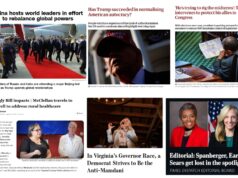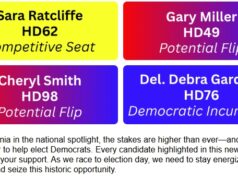Former Virginia House of Delegates Democratic Leader David Toscano retired from politics in 2020, after but he certainly doesn’t appear to be slowing down, with his first book (“Fighting Gridlock: How States Shape the Nation and Our Lives“) coming out last year, and now with his second book, “Bellwether: Virginia’s Political Transformation, 2006-2020“ hot off the presses. Former Leader Toscano certainly is qualified to address the topic of Virginia’s political transformation since 2006, given that he served in the House of Delegates during that entire period, including as Minority Leader from 2011 through 2020.
In 2019, Toscano decided not to seek reelection, just as Democrats were on the cusp of taking the majority (after getting to 49 seats in 2017, they gained six seats in 2019 to reach 55 out of 100 – their first majority since the late 1990s), but he certainly came close, with control of the House of Delegates in 2018-2019 coming down to a TIE in HD94, and the winner being chosen by a name being pulled out of ceramic bowl). So…disappointing for Toscano, no question, but on the other hand, he helped lead Virginia House Democrats to the edge of the “Promised Land,” even if he never got to enter that land. And he also helped usher in one of the most consequential pieces of legislation in Virginia history – Medicaid expansion. In other words, there’s nothing to be ashamed of and a lot to be proud of for David Toscano, who writes in the book that he was burned out – “someone I did not want to be – not so patient, frequently frustrated, and rarely enjoying the position” – by that point anyway, and was definitely ready to retire regardless. And before I forget, thanks to David Toscano for his tremendous service to Virginia!
My personal impression of Toscano was always that he did the best he could given the small number (mostly in the 30s out of 100, except for the last two years, when he barely missed becoming Majority Leader or Speaker) of Democrats in the House of Delegates during his tenure as Minority Leader. But watching from the “cheap seats,” it always seemed incredibly frustrating to me, with Toscano mostly standing up, giving a passionate speech for the Democratic position, then sitting (mostly) helplessly as Republicans won yet another round of a lopsided battle. As Toscano somewhat mournfully writes in his book, “Since I was never in the majority, I had to live with decisions made by the majority simply because they had the votes.” Very frustrating, especially when that majority was so regressive and wrong on most issues, and when Toscano was almost always right in terms of what he was arguing…but didn’t have the numbers to put his views into effect. Still, Toscano got to be the “man in the arena,” or as he repeatedly says in the book, “in the room where it happened,” and that’s absolutely nothing to sneeze at.
Anyway, here are a few thoughts on Toscano’s book, including things I really liked, things I found interesting, and things I didn’t like so much (or at all).
- Toscano spends a lot of time exploring the changing meaning of the phrase, “The Virginia Way.” Personally, my views tend more towards Jeff Thomas’ not-particularly-positive view of “The Virginia Way,” with the focus on corporate power over our government, a sort of faux gentility covering up a lot of bad stuff (including racism, sexism, etc.), a “wild west” in terms of campaign finance and ethics (in 2020, Virginia was ranked one of the worst states in the country on ethics and transparency in government), etc. As for Toscano, he acknowledges that, at least historically, “The Virginia Way” was largely defined by the “Byrd Machine,” segregation, “racial paternalism,” “white elites,” “Massive Resistance,” etc. That “Virginia Way,” in Toscano’s view, needed “a massive overhaul, if not a total discard,” keeping the supposedly “respectful” way in which “we deal with disagreement,” while becoming “more progressive in its policies and inclusive in its politics”; that “celebrates diversity” and is “inclusionary in how decisions are made and benefits distributed.” But are we actually moving in that direction? It sure seemed like it when Democrats had a “trifecta’ in Richmond, or even during the 2018-2019 General Assembly, when the Democrats demonstrated the “Power of Forty-Nine,” as Toscano puts it in Chapter 12 of his book. In the end, though, it’s hard to really define what people mean when they refer to the “Virginia Way,” or whether its supposed “civility” and “political collaboration” ever really existed, other than as a facade over a bunch of bad stuff, combined with a relentless “business-friendly” tilt to Virginia’s economic policies.
- For instance, what does this passage in Toscano’s book mean exactly: “What will the next generation of leaders in the Commonwealth learn from reckoning with the traditional Virginia Way? The racially oppressive elements are easy to reject. But will Virginia still pride itself on a moderation in tone even as Progressives push a bold agenda and polarization remains apparent? Can inequity be addressed without rancor and pitched battles? Is there room in the Commonwealth for a modern and inclusive ‘Virginia Way’ that will reject its racial history but still embrace positive elements of civil discourse and collaborative decision-making?” Among other issues I’ve got with that passage: 1) I wonder if “racially oppressive elements” are really that “easy to reject” or are they more deeply entrenched; 2) Virginia can “pride itself on a moderation in tone,” but what does that even mean, especially when we see the VA GOP moving FAAAAR right in both substance and tone, with its chairman and candidates regularly putting out virulent, extremist messages?; 3) as for Toscano’s reference to “rancor and pitched battles,” this would be as good a place as any to note that Trumpist extremism – including LOTS of “rancor!” – has risen in recent years on only ONE SIDE of the political divide in this country – the right; 4) “polarization” is a weak, inaccurate, honestly ridiculous word to describe what’s happening in this country’s politics, given that *only one side* – again, the Trump Republican Party – has “polarized,” with the other “side” – the Democrats – overwhelmingly remaining in the American mainstream, center-left. Throughout the book, Toscano repeatedly tosses around cliches like “polarization,” “partisanship,” “political divisions,” “the extremes of each party” (!!) and “partisan gridlock,” which are really not reflective of what’s actually happening in U.S. and Virginia politics (which, again, is a massive lurch to the far right by the Republican Party). Frustrating.
- When it comes to Virginia’s alleged “pay-to-play” political culture, Toscano mostly seems to dismiss or minimize those concerns, arguing that he “never heard a lobbyist suggest that a legislator vote in a certain way because of a campaign contribution”; that “most legislators attempt to ‘wall themselves off’ from impropriety”; that in fact “business does not always get its way” in the Virginia General Assembly”; etc. Let’s just say that I’m HIGHLY skeptical of any/all of those claims. To the contrary, I’d argue that corporate interests (Dominion Energy, for instance) in Virginia have overwhelmingly gotten their way, at least until the Democratic “trifecta,” which is partly why Virginia for years ranked so low (#51 in 2018) when it comes to workers.
- I was wondering if Toscano would use his book to settle scores, to “dish” on his former colleagues, etc. In the end, though, he didn’t really do much of that at all, other than expressing some exasperation with Del. Sam Rasoul (about whom Toscano says that he “frequently differed with Caucus leadership about campaign strategy and policy initiatives,” and that his “Green New Deal” bill had “great aspirations” but “was a policy mess”) and the group “Clean Virginia” (Toscano strangely – and falsely, in my view – accuses them of “quid pro quo” and/or “pay to play,” even as he mostly absolves and/or goes easy on corporations, including Dominion Energy, when it comes to buying influence and acting as a corrupting force in Richmond). Toscano certainly does rip the House of Delegates’ self-proclaimed “Chief Homophobe,” Bob Marshall, for being a “frequent irritant” who “never passed many bills” and espoused a “far-right agenda infused with a healthy dose of conspiracy theory.” But I was kind of expecting Toscano to really cut loose on some people, on both sides of the aisle, and…he really didn’t do that.
- Toscano *does* use the book to praise some of his colleagues, both Democrats and Republicans, including former Speaker Bill Howell (“reinforced the traditions and norms of the Body so critical for transactional decision-making”; for my views on the guy I called Bill “ALEC” Howell, see here); Senator Janet Howell (“ran the Senate Finance Committee with acumen and humor”); Sen. Mamie Locke (her “calm persona concealed a commitment to Civil Rights that was unmatched in the Body”); Sen. Scott Surovell (“introduced so many bills of major consequence that many wondered if he ever slept”); Senate Democratic Leader Dick Saslaw (“the most consequential senator” who supposedly “knew much more about energy policy than many of his critics” – uhhhh, no); Del. Eileen Filler-Corn (“She was deliberate, and understood both what she knew, and most importantly, what she did not”); Del. David Bulova (a “workhorse” who “understood nuance in ways most others did not”); Del. Mark Sickles (“an expert on health policy”); Sen. Jennifer McClellan (“members always looked to [her] when education was being debated”); Del. Alfonso Lopez (“worked tirelessly to promote the rights of New Americans and argue for those who had little power or wealth”); Del. Rip Sullivan (“won a major victory in the 2020 session with the passage of the gun safety measure called the Extreme Risk Protector Order…helped engineer another triumph…Virginia was now poised to become one of the leaders in the new energy economy”); etc.
- Toscano’s perspective on “strong divisions within the Democratic House caucus, and between the House and the Senate” – particularly after Democrats took control of both chambers and with pressure to undertake major criminal justice reforms after the murder of George Floyd – is very interesting, and well worth reading. According to Toscano, “disagreements emerged about what criminal justice reform measures should be passed immediately, and what ideas required further study to avoid unintended adverse consequences,” with some of the newer House Democrats “[speaking] frequently of ‘seizing the moment'” on issues like parole, “qualified immunity,” marijuana legalization, and with the Virginia Legislative Black Caucus feeling that “the urgency of action was palpable.” According to Toscano, the State Senate slowed some of this down or even stopped it: “At the instigation of the Senate and Democrats like Scott Surovell, an attorney from Fairfax who had become a force for moderation after he left the House and now relished tamping down some of the progressive initiatives of the other Body, full [marijuana] legalization should be phased in over time” (note: I suspect that Sen. Surovell might not fully agree with this characterization).
- Toscano has an interesting review of redistricting in Virginia during his time in office, including the House Republicans’ cynical deal with Senate Democrats and several African-American delegates in 2011, and then the fatally flawed redistricting amendment that Toscano VERY understatedly describes as “not the best of all redistricting reform plans.” According to Toscano, “Democrats could have easily stopped the amendment before it got onto the ballot and would then have been able to control the entire redistricting process in 2021.” Toscano then opines that “[t]he fact that they did not do so may be an indicator that the majority party will operate differently than others have in the past.” Which is kind of an odd thing to say, given that the vast majority of House Democrats voted *against* the redistricting amendment, argued passionately against it, tried to stop it, etc. In fact, the reasons the redistricting amendment made it into the constitution were: 1) Republicans unanimously supported it; 2) Democrats in the Senate mostly supported it, which was a huge mistake; 3) Democrats in the House of Delegates barely failed to stop it, which was also a huge mistake; and 4) the voters – swayed by a TON of money, including from out-of-state donors, and disinformation about the amendment, voted for something they believed would stop “gerrymandering,” which most voters reflexively hated. What passage of this amendment did NOT signify was the dawn of a better day in Virginia, as Toscano seems to believe…
- Toscano also has interesting discussions of – among other things – the powers of governors vis-a-vis the legislature; an insider account of how the “Blackface” scandal played out (and how it, ironically, played a role in Ralph Northam becoming “one of the most consequential governors in Virginia history”); the relationship between those “in the room where it happens” and outside activists (such as gun violence prevention activist and Virginia Tech mom Lori Haas); the enormous accomplishments of the legislature under Democratic leadership in 2020-2021; etc.
- Finally, note that Toscano wrote this book leading up to the 2021 election, which clearly did NOT end up reinforcing Virginia’s transition to “blue” since 2006, but instead saw a significant backsliding. Where I think the analysis in this book doesn’t quite ring true is the failure to talk enough about how the 2017-2020 “blue tsunami” was heavily about anti-Trump backlash, and how the 2021 Republican victories was in significant part about the rise of a reactionary backlash on the *right* (e.g., even as Terry McAuliffe received 200,000 more votes than Ralph Northam did in Northam’s landslide 2017 win, Republican turnout increased a massive 500,000 from Ed Gillespie in 2017). And it’s too optimistic, in general, about Virginia moving (inexorably?) towards better days. The fact is, nothing is guaranteed, and the “arc of the moral universe” only “bends towards justice” through OUR RELENTLESS EFFORTS to bend it in that direction (and keep it from lurching backwards).
In sum, there’s a lot of interesting material in David Toscano’s new book, by a person who truly was “in the room where it happened,” and it’s well worth reading for that reason alone. However, as you can see above, there were many times in reading the book where I was frustrated on a number of fronts. But you can judge that for yourself, when you read the book!














